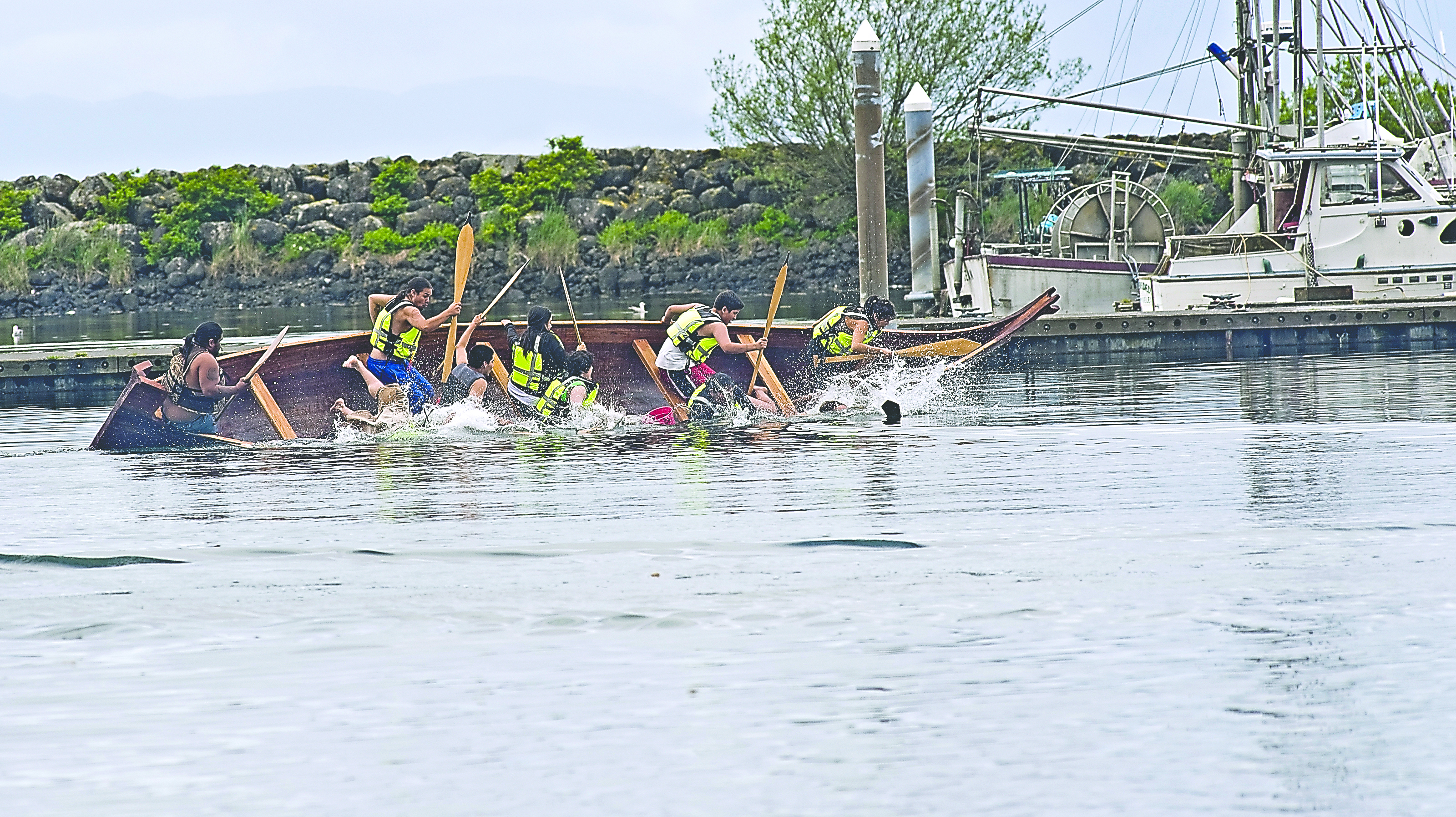By Debbie Ross-Preston For Peninsula Daily News
NEAH BAY — As more than 100 tribal canoe crews prepare to paddle to the Quinault tribe’s homelands on Grays Harbor County’s Pacific coast, Tribal Canoe Journey veterans zero in on safety.
“It’s one thing to know that the Pacific Ocean is cold and that it is difficult to right your canoe in the swells — it’s another thing to actually experience it,” said Polly McCarty, Makah Canoe Society member and a co-organizer of tribal canoe safety gatherings.
Tribal canoes from the Pacific Northwest, British Columbia and beyond will travel from their homes during the Paddle to Quinault 2013 and gather at Point Grenville in Taholah, home of the Quinault tribe, for a celebration from Aug. 1-6 that’s open to the public.
Taholah is located at the mouth of the Quinault River 9 miles north of Moclips in northwest Grays Harbor County.
Along the way, canoe paddlers will stop for rest and tribal potlatches offering feasting and sharing of tales, songs and gifts.
Cold-water practice
Organizers have encouraged tribal crews, especially those new to the journey, to go to the water off the North Olympic Peninsula coast and practice before starting the Canoe Journey.
Recently, the Makah and Hoh tribes hosted a two-day safety and crew meeting that featured Coast Guard briefings and practicing what to do after getting spilled into the 50-degree waters.
“Just experiencing that ‘take your breath away’ moment helps you know what to expect,” McCarty said.
Each year, the crews aim for fewer overturned canoes, she said.
Crews practice tipping over, then positioning themselves on either side of the canoe to rock out as much water as possible before one crew member climbs on board and begins bailing.
Bailers are added as the canoe is emptied of water.
An experienced crew can empty the water from an overturned canoe and be back on board in fewer than 10 minutes.
“Otherwise, you might have to tow a canoe filled with water and that can become a safety hazard if the weather is rough,” McCarty said.
Some use the capsizing lessons to help them decide whether they will participate in the journey.
“You have to be always vigilant out on the open ocean,” McCarty said.
“Anything can happen, especially when it gets foggy.”
Joseph Andrew “Jerry” Jack, 68, a hereditary chief of the Mowachaht/Muchalaht tribe on Vancouver Island, drowned July 26, 2006, when the Makah canoe in which he was paddling capsized in stormy weather west of Dungeness Spit during that year’s Canoe Journey to Seattle.
Five others in the canoe were rescued, and three of them were taken to a hospital for treatment of hypothermia. Jack wasn’t wearing a life jacket, and the canoe didn’t have an escort boat, the Coast Guard said.
Crew camaraderie
The months preparing for the Canoe Journey build closeness and trust among crew members — and create the teamwork and camaraderie needed to move the canoe through the water efficiently.
“It really is a family, and it’s important to welcome new crew members like family,” McCarty said.
“Everyone has their niche in the canoe, and it’s a real bond that develops.”
She laughed when she recalled gliding into the Makah Marina one evening after several hours in the canoe.
“We were at the dock and the skipper had called out the order of who was getting out of the canoe,” she said.
We were enjoying talking to one another, and maybe 10 minutes went by and the skipper finally said, ‘Are you guys getting out?’”
The bond in the canoe is much different than seeing someone around town or at other gatherings, McCarty said. “It’s a special relationship.”
She hopes to see those relationships endure as youth who are now going to college move into tribal government positions.
“It’s my hope that those relationships forged on the water between different tribes helps us work together better in the future.”
The Canoe Journey is a revival of Native American tradition that started with the 1989 Paddle to Seattle. It has grown into annual event, with tribes taking turns to host a weeklong celebration at the journey’s end.
Landings during this year’s canoe journey are scheduled for July 21 at Port Townsend, July 22 at Jamestown — to be welcomed by the Jamestown S’Klallam — and July 23 at Port Angeles, where the Lower Elwha Klallam will host a two-day celebration.
On July 25, tribes will paddle to Pillar Point, followed by a landing at Neah Bay, where they will be greeted by the Makah.
On July 27, canoes are to travel to Ozette and then on July 28 to LaPush for a two-day celebration hosted by the Quileute.
The canoes are expected to reach the Hoh River, and the Hoh tribe, on July 30, go on to Queets on July 31 and reach Quinault lands on Aug. 1
Safety on the water is a concern of all the tribes involved in the journey.
For more information on training and www.paddleto quinault.org website.
Tips on training and a list of equipment needed during the journey can be found at http://tinyurl.com/quinaultcanoe societytips.
________
Debbie Ross-Preston is the coastal information officer for the Northwest Indian Fisheries Commission.
PDN Managing Editor/News Leah Leach contributed to this story.

